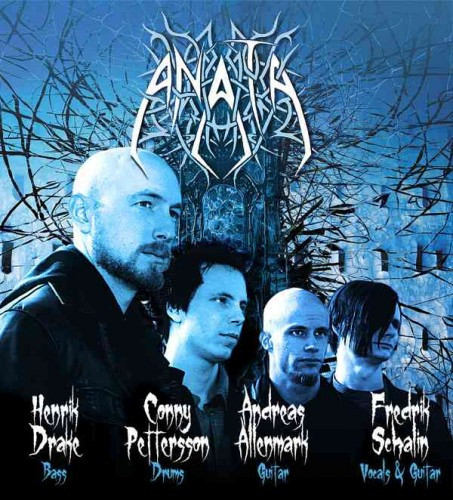
(In this latest edition of the Synn Report, Andy Synn reviews the four-album discography of an amazing technical death metal band from Sweden — Anata.)
Recommended for fans of: Gorod, Nile, Necrophagist
I told you I wanted to break up the more black metal-y trend of the column, didn’t I? Well feast your eyes, ears, and whatever other senses you feel inclined to use, on the blistering technical death metal of Anata!
Hailing from Varberg, Sweden, the band (currently a three-piece, but historically performing and recording as a quartet) have produced four albums since the release of their debut in 1998, each one getting steadily more complex and refined, more intense and blistering, as the years have unfolded, striving to achieve a perfect balance between progressive complexity, technical wizardry, and shocking brutality.
With tech-death, what primarily differentiates the bands from each other is the roots they draw from. Obscura draw more obviously from Morbid Angel/Death than many others. Gorod owe a large debt to Cynic/Atheist. Beneath The Massacre pull mostly from the Cryptopsy/Dying Fetus school. What I hear most strongly from Anata, though, is the undercurrent of early Nile/Decapitated that runs through a lot of their material (particularly on the first two records) – the sort of blistering, sand-blasting technicality that focusses more on harsh tempo shifts and syncopated discordance over unerring blasting or whirlwind fretwork.
Granted, there’s more than a hint of Suffocation to their sound as well, coupled with a hefty dose of capital-M morbid melody, but the group’s delivery is less about extroverted extremity and more focussed on expressing their introverted neuroses and contradictions. Indeed, this sets them another step apart from the more extreme of their technical brethren, as the difficulty and complexity of Anata’s songs comes from more than just outrageous technicality or brutality, but also from the off-kilter, unsettling arrangements and unquantifiable methods the band employ!
The Infernal Depths of Hatred – 1998
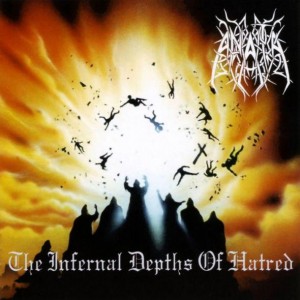 The band’s impressive debut album begins with “Released When You Are Dead”, an amalgam of scintillating technique and raw, ugly death metal groove. There’s a lot happening in this song, with its often Nile-esque mix of shredding riffs and thunderous, rolling kick drums, but the track’s shape-shifting structure somehow manages to keep it all flowing and coherent. Dizzying technical guitar-work slams straight into brutal death metal riffage in a colossal pile-up of mangled metal and throat-rending screams, pierced by fleeting flashes of razor-sharp Gothenburg melody.
The band’s impressive debut album begins with “Released When You Are Dead”, an amalgam of scintillating technique and raw, ugly death metal groove. There’s a lot happening in this song, with its often Nile-esque mix of shredding riffs and thunderous, rolling kick drums, but the track’s shape-shifting structure somehow manages to keep it all flowing and coherent. Dizzying technical guitar-work slams straight into brutal death metal riffage in a colossal pile-up of mangled metal and throat-rending screams, pierced by fleeting flashes of razor-sharp Gothenburg melody.
“Let The Heavens Hate” goes from an ascending, uber-melodic guitar introduction right into a series of twisted, harmonically pierced riffs drawn straight from the Suffocation playbook, but accents them with recurrent melodic runs and soaring chord progressions, in doing so crafting an odd mix of hammering, heretical death metal and supreme, transcendent melody.
The winding, tremolo driven “Under Azure Skies” has a primitive, creeping Suffocation-style intro riff, that eventually develops into a prowling tremolo/chord sequence overlain with some blood-curdling shrieks, and interspersed with passages of acid-drenched melody. A calm interlude of acoustic guitar work showcases early hints of the progressive tendencies that the band would later develop more fully, which slowly works its way back into a sequence of bone-rattling snare blasts and hypnotic, winding bass-lines.
The second half of the album actually manages to one-up the brutality and insensate brilliance of the first half, with songs like the scathing “Slain Upon His Altar” and the proggy shock and awe of “Dethrone The Hypocrites”, throwing all caution to the wind in their ceaseless efforts to bludgeon and brutalise the listener, both mentally and physically. That’s not to say there aren’t moments of subtlety and grace though, particularly in the former, where a soothing instrumental intro provides a temporary calm before the subsequent storm of electric tremolo lines and sizzling technicality.
The album is capped off, however, with “Aim Not At The Kingdom High”, an adamantine assault of nail-gun guitars and edgy, rattling drum-rolls. The crushing, chugging riffs are deployed with lethal precision, unleashing tempo-shifting volleys of juddering drum blasts and angular, techy guitar work. The song’s massive, aggressive dynamic hits like a tidal wave of sheer metallic power, piercing stabs of sharpened tremolo and slamming, blunt-force riff-hammers leading up to an undulating, proggy mid-section of noodling bass and reverberant guitar melodies, before a final convulsive blast of power brings it all to a close!
Sample song: “Dethrone The Hypocrites”
[audio:https://www.nocleansinging.com/wp-content/uploads/2012/08/07-Dethrone-the-Hypocrites.mp3|titles=Anata – Dethrone the Hypocrites]
Dreams of Death and Dismay – 2001
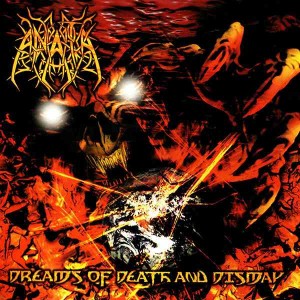 There’s a decidedly heavier and more aggressive edge to Anata’s second album, as immediately evidenced by the nastier, evil vibe of “Die Laughing”, whose chunky, suffocating riffage demonstrates right away the unforgiving and uncompromising nature of the record.
There’s a decidedly heavier and more aggressive edge to Anata’s second album, as immediately evidenced by the nastier, evil vibe of “Die Laughing”, whose chunky, suffocating riffage demonstrates right away the unforgiving and uncompromising nature of the record.
The predominantly guttural growls are utterly savage, drawn from the very depths of the soul, while the drums in particular have taken a step up in both complexity and gut-wrenching force. The guitar tone is stupendously heavy and ferocious, keeping the death metal brutality even as the song diverges into warped, atonal melody, staggering under the sheer weight of its thrusting, staccato riffage.
The album doesn’t pause for breath, plunging into the double-header of “Faith, Hope, Self-Deception” and “God of Death”. The contorted, low-end ugliness of the former is interspersed with strange stop-start accents and strained, tormented melody, marching relentlessly through a procession of face-melting blast-beats and sickening, grinding riffage. The latter is a groaning behemoth of heaving gravity and dense, impenetrable groove, providing a prime offcut of thick, bloody riffage and sharp, biting leads.
The truly abrasive “Can’t Kill What’s Already Dead” showcases the split-brain division between death metal brutality and technically stunning musicality, with more than a touch of early Carcass to the throttling, air-tight structure of the song. The bass has a nicely prominent presence throughout, adding a slick, oily undercurrent of malevolence to offset the syncopated blast and bludgeon of the complex drum patterns and jerky, almost mechanical riffage.
“Insurrection” pummels and pounds with piston-driven power, bristling with angular, Decapitated-esque riffage and stomping pace. The truly compelling guitar parts pulse with evil hooks, while the more menacing atmosphere of the record sees the band strip away some of the more overtly melodic layers from the previous album, whilst retaining a hypnotic, evil vibe throughout. The doomy mid-song breakdown adds some welcome variety to the album, its crushing chords providing a horrific background to an ear-splitting, flesh-searing solo.
Snorting like a bulldozer, “Drain of Blood” has a grinding, belligerent groove right from its bouncing, tom-heavy intro. Sudden breaks into scattergun blast-beats mix up the rolling death metal dynamic, while the tightly twisted tech-thrash riffage sees the band’s two guitarists endeavouring to wring the last drops of blood from their bleeding, broken fretboards.
Sample song: “Can’t Kill What’s Already Dead”
[audio:https://www.nocleansinging.com/wp-content/uploads/2012/08/06-Cant-Kill-Whats-Already-Dead.mp3|titles=Anata – Can’t Kill What’s Already Dead]
Under A Stone With No Inscription – 2004
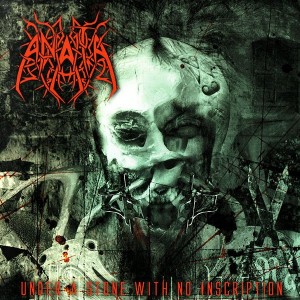 Their third album sees Anata take the bit firmly between their teeth and really hit their stride. The instrumental attack is both more rabid and more refined, while every song’s composition is now reflective of a striking, individual thought pattern.
Their third album sees Anata take the bit firmly between their teeth and really hit their stride. The instrumental attack is both more rabid and more refined, while every song’s composition is now reflective of a striking, individual thought pattern.
The hyperactive mayhem of “Shackled to Guilt” immediately sets the tone for the record, its whirling, supercharged riffage subtly concealing a compelling melodic undercurrent and an array of insidious hooks. The drummer is flawless, attacking his kit with a mix of blazing ferocity and mind-bending complexity, switching tempos and styles to accent and empower the dizzying spirals of brooding harmony.
The frenzied blasting of “A Problem Yet To Be Solved” is a perfect example of intelligent design wielded with maniacal vigour. The unbreakable riffage is diamond-edged and crystal-clear, while the ever-changing, always-versatile drumming of Conny Pettersson delivers unerring, eardrum pounding, bone-breaking brutality from start to finish. The bass tone is also more prominent than ever, its thrumming power presaging each of the song’s devastating, sludge-coated breakdowns.
The intoxicating venom of “Entropy Within” displays an almost Arsis-like embrace of dissonance as melody, weaving these threads of jarring, uncomfortable dissonance together into one cohesive pattern. The whole thing is organised and arranged so tightly that at times you become almost unaware of the blinding torrent of staggered, chugging riffs, frenetic needles of melody, and crazed, tapping lead work.
The visceral, chest-bursting assault of “Built on Sand” is based on a series of damage-inducing death metal riffs, injected with a coldly calculated dose of malicious melody, and topped off with a jazz-inflected, panic-inducing solo to close, while “The Drowning” is a stunning hybrid of dark, liquid melody and ripping, megalithic riffage. Ripping and tearing from start to finish, it takes a diversion into haunting atmospherics mid-way through, building to a dramatic, melodic flourish which leads the song back into its tooth-and-nail finale.
To finish things off, “Any Kind of Magic or Miracle” incorporates some clever progressive touches into the mix without losing any power or momentum, building into a glorious epic of annihilating proportions. Using its extended length to its advantage, the song tells a more drawn-out and moodily intense story of crushing Nile-esque chords and ripping fretboard fireworks.
Sample song: “Entropy Within”
[audio:https://www.nocleansinging.com/wp-content/uploads/2012/08/03-Entropy-Within.mp3|titles=Anata – Entropy Within]
The Conductor’s Departure – 2006
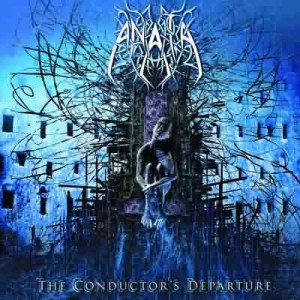 Their fourth album sees Anata further develop the identity they have established over the years, deploying greater innovation and a streamlined clarity of purpose. Largely, the record avoids the madcap pace of the previous album and sticks to a more high-mid-tempo speed (interspersed with some terrific, molten blast sections) which often serves to cleverly disguise the sheer intensity of the hammering drums or mangled, contorted riff-work on offer.
Their fourth album sees Anata further develop the identity they have established over the years, deploying greater innovation and a streamlined clarity of purpose. Largely, the record avoids the madcap pace of the previous album and sticks to a more high-mid-tempo speed (interspersed with some terrific, molten blast sections) which often serves to cleverly disguise the sheer intensity of the hammering drums or mangled, contorted riff-work on offer.
The aptly named “Downward Spiral Into Madness” is a belligerent statement of intent, clever, whirling stick-work guiding and directing the buzzing swarm of swiping, stinging notes. Some incisive melodeath touches give a slight Gothenburg tinge to the slashing riffs, which, combined with the use of unpredictable repetition and artfully altered recurrence, serves to give the track its structure and compelling hooks.
“Better Grieved Than Fooled”, sees the group pushing their boundaries and venturing into more progressive territory, shades of Edge of Sanity colouring the pronounced instrumental passages and jazzed up death metal fury, leading into “The Great Juggler”, where the alien orchestration of frantic riff work and obtuse melody is conducted by a series of vibrant, dramatic drumming flourishes.
Beginning with some striking, baroque-influenced guitar work, “A Cold Heart Forged In Hell” is composed of labyrinthine passages of intricate riffage and cascading fretwork, whose post-millennial, pseudo-thrash ferocity brings to mind the warped, atonal compositions of Martyr, topped off with a coiled, serpentine bass-line and a dominating vocal roar.
The sheer instrumental clarity that is achieved here is testament to the band’s technical and compositional skills. Everything seems perfectly placed and naturally performed, from the dreadnought crawl of “I Would Dream of Blood”, to the out-of-control pacing of “Disobedience Pays”, which sees all dials driven into the red for a 5 minute master-class in breakneck speed and finger-shredding wizardry.
The album ends with the wilfully difficult, but ultimately rewarding title track, “The Conductor’s Departure”, whose every riff, solo, drum fill, and vocal part is perfectly designed, form adapted to function, in a manner both organic and deliberate. Like some terrifying death metal leviathan it slowly uncoils, shedding its early, doom-laden skin to reveal a dark heart of gloomy melancholy and grinding metallic vitriol.
Sample song: “The Great Juggler”
[audio:https://www.nocleansinging.com/wp-content/uploads/2012/08/04-The-Great-Juggler.mp3|titles=Anata – The Great Juggler]

These guys are the gold standard of technical death metal, IMO.
I found out about this band back in the summer of 2010 and included them in this feature – – and then lost track of them. Andy’s post reminded me of how amazing their music is.
https://www.nocleansinging.com/2010/06/21/smorgasbord/
I’ve been listening to these guys for roughly 7 years. I love the whole discography from them. I kind of was hoping this article might have some hint to what Anata has been doing for the last few years. I hope they put out another album eventually.
One of the best TDM bands around. Are they still active? I remember them having samples up of some new songs, post The Conductor’s Departure. What ever happened to those?
I poked around the internet this morning to see what I could find. There have been rumors of some problem between Anata and their label (former label?) Earache, as well as reports (apparently from Earache) that Anata never finished recording the new album although the drums were tracked in spring 2008. I’ve not found anything recent about where it stands.
Anata are an excellent band that I unfortunately rarely listen to due to the massive influx of new material that I take in daily. I really need to rectify this at some point.
This is a band I would love to see make a comeback
First time I’ve managed to actually read my own article and the comments since being away for the weekend…
But I dub this edition of The Synn Report a success!
Did you have some good, clean, wholesome fun at Bloodstock?